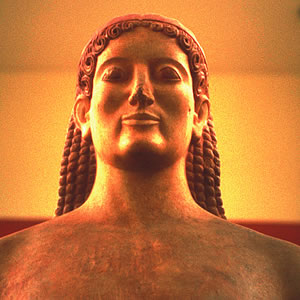HISTORY
A Late Bloomer
The GLBT Movement in Greece
by Dimitri Tsambrounis
 With homoerotic ancient Greek history and mythology and two of the top gay and lesbian destinations in the world (the islands of Mykonos and Lesbos), you would expect that Greece would be a haven of equality, pleasure, fun and freedom for all. The reality is, however, shamefully different. With homoerotic ancient Greek history and mythology and two of the top gay and lesbian destinations in the world (the islands of Mykonos and Lesbos), you would expect that Greece would be a haven of equality, pleasure, fun and freedom for all. The reality is, however, shamefully different.
As in many Mediterranean countries, lots of Greeks lead a very "bisexual" life, but on the sly. Much worse, homosexuality is often the subject of ridicule, so the overwhelming majority of lesbians and gays keep themselves deep in their closets, and public acceptance of homosexuality is the second lowest in the recently enlarged EU.
Male homosexuality was decriminalized in Greece in 1950. Since then, no substantial legal steps have been taken to ensure the rights of homosexuals. (Female homosexuality is remains unheard-of, both in law and public debate.)
The first time LGBT people marched in the streets in Greece was in 1977, spurred by a draft law supposedly aiming to combat STDs. If the law passed, homosexual men would be subject to arrest merely for the intention of having sex! A swift response was initiated, headed by transvestites, and soon the first LGBT movement was formed. Personalities including Manos Hatzidakis and Melina Merkouri joined the demonstrations and after the protests, the paragraph concerning homosexuals was dropped.
AMFI, the first LGBT newspaper in Greece with a broad readership, was a huge success in the late 70s, but the dynamic that emerged did not endure, and the movement lapsed into a coma, save for the few brilliant exceptions of lone activists. Homosexuality quite simply disappeared from public debate.
Greece is one of the few countries in the EU that still has discriminatory laws against gay men: the age of consent is different from that of heterosexuals. More importantly, "unnatural male offences" for the purpose of profit, i.e. male prostitution, are still criminalised. As for the media, they tend to present homosexuals in a negative light, promoting the stereotype of the effeminate man. Lesbians are simply non-existent. Gay men are sometimes bullied by police officers in cruising areas, and a couple of gay clubs were raided by the police in 2003 on the unfounded pretext of paedophilia. Only a few months ago, the applications of three transsexual women to attend a night school were rejected. There have also been cases of lesbians and gays being evicted from their homes or even losing their jobs. Pride parades still remain science fiction in this country.
There is, however, hope that things are changing. Homosexuality is increasingly mentioned by the media, but mostly in relation to what is going on abroad rather than as issues being openly confronted and discussed in Greece. In February 2003, the police raided a gay club, made 12 arrests and violated their civil rights; one of the arrested men committed suicide. In response to that, a number of organisations signed a press release / protest and an LGBT forum was formed. That forum soon evolved into an open monthly meeting of all LGBT organisations and NGOs with gay issues on their agenda. This forum brought LGBT people in direct face-to-face dialogue for the first time ever on such large and regular scale. Furthermore, LGBT blocks have started appearing in political demonstrations. Last year saw the publication of two gay and lesbian magazines and one newspaper. In addition, new gay groups are appearing outside the two major cities of Athens and Thessaloniki. Several gay and lesbian bars have recently opened, and Athens now boasts a nascent gay village.
The Greek gay community might not show the flamboyant dynamic of the late 70s and its actions may still be very modest, but there is no question that it is growing bigger and stronger.
|


